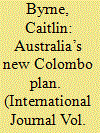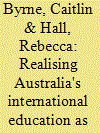|
|
|
Sort Order |
|
|
|
Items / Page
|
|
|
|
|
|
|
| Srl | Item |
| 1 |
ID:
143522


|
|
|
|
|
| Summary/Abstract |
The New Colombo Plan (NCP), a key plank in the Australian government’s foreign policy agenda, leverages student mobility as public diplomacy to improve Australia’s standing and influence within the Indo-Pacific region. Conceptualized as a “rite of passage” for young Australians, the NCP has been welcomed by Australian business, industry groups, and stakeholders because of its potential to deliver lasting relationships and practical economic benefits. Coordinated by the foreign affairs portfolio, the NCP represents a significant and distinct component of Australia’s public diplomacy, firmly aligned to advance the state’s economic diplomacy agenda. This paper explores the evolution of the NCP. It draws on stakeholder impressions from the program launch and pilot to explore early limitations and deeper soft power challenges. Findings suggest that the NCP is robust, yet key issues of strategic coherence, partnership, and evaluation require further attention if it is to deliver on its soft power promise.
|
|
|
|
|
|
|
|
|
|
|
|
|
|
|
|
| 2 |
ID:
147634


|
|
|
|
|
| Summary/Abstract |
Peter Varghese AO, Secretary of the Department of Foreign Affairs and Trade (DFAT), refers to diplomacy as ‘the compass by which Australia makes its way in the world’. Its core task – to advance the nation’s security and prosperity – remains unchanged across decades.
|
|
|
|
|
|
|
|
|
|
|
|
|
|
|
|
| 3 |
ID:
181945


|
|
|
|
|
| Summary/Abstract |
Researchers have increasingly investigated emerging regional citizenships outside the European Union, including in Southeast Asia, South America and West Africa. Their accounts have, however, largely focused on efforts by regional organisations to promote a regional identity and enhance mobility. This article applies a broader comparative framework disaggregating regional citizenship into six constitutive elements. The approach enables a more comprehensive analysis of the nature and shape of emerging organisational citizenship regimes, the identification of potentially significant alternatives, and more systematic comparisons of both across global regions. It is applied first in identifying a duties-centric, top-down and developmental conception of citizenship implicit in recent communications to ‘ASEAN citizens’ by the Association of Southeast Asian Nations. That conception is compared to alternatives, including one implicit in Amitav Acharya’s model of participatory regionalism, and one drawn from field work among regionally networked, digitally focused social entrepreneurs within ASEAN states. The latter indicate a conception which is duties centric but also foregrounds entrepreneurs’ potential for agency and leadership in regional development. We close with a discussion of different practical challenges, related to different elements of citizenship, each conception faces, and the potential for alternatives such as entrepreneurial regional citizenship to influence emergent organisational regimes.
|
|
|
|
|
|
|
|
|
|
|
|
|
|
|
|
| 4 |
ID:
127063


|
|
|
|
|
| Publication |
2013.
|
| Summary/Abstract |
Australia's international education serves as public diplomacy, essentially engaging and influencing public audiences in ways that progress Australian foreign policy priorities and national interests. The multidimensional and increasingly globalised nature of international education presents enormous opportunity for vital exchange and interactions between and with students, academics and communities via onshore and offshore modes of delivery. Positive experiences of student mobility and the development of intellectual, commercial and social relationships can build upon a nation's reputation, and enhance the ability of that nation to participate in and influence regional or global outcomes. This is ultimately the essence of soft power. While Australia has made significant commercial gains through international education, it has fallen short of realising the soft power potential inherent in the volume and depth of interactions, relationships and achievements resulting from it, particularly in the Asian region, where Australia's international education sector continues to be most active. This article argues that there is a soft power benefit in recognising international education as public diplomacy, though acknowledges that challenges exist in connecting the soft power aspirations to reality. Findings suggest that there is room for more coherent public diplomacy leadership and inter-agency coordination, improved evaluation and expanded dialogue both within the sector and the broader community.
|
|
|
|
|
|
|
|
|
|
|
|
|
|
|
|
|
|
|
|
|